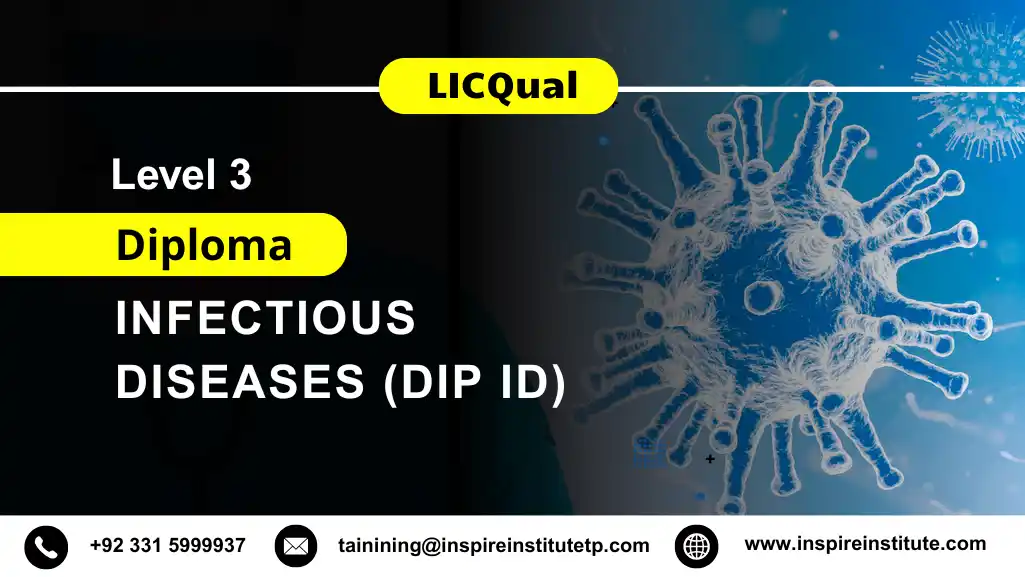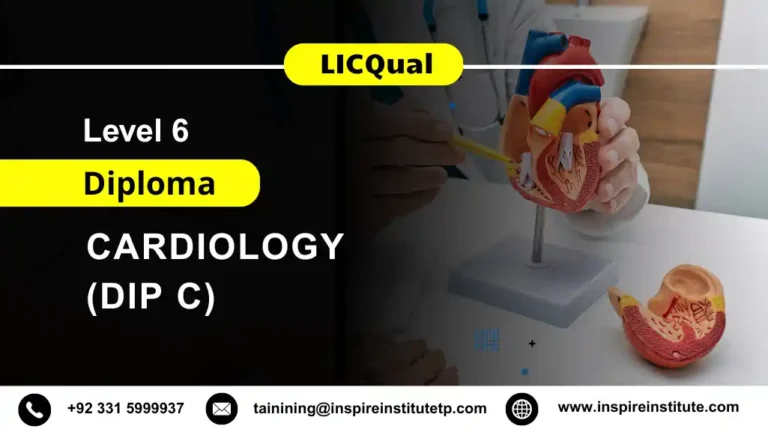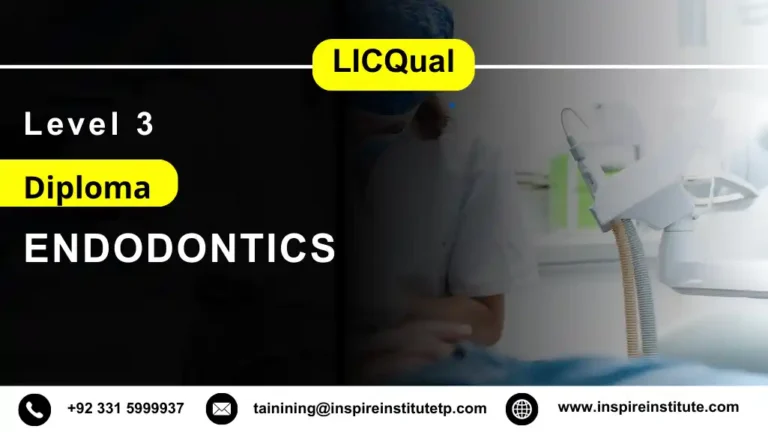LICQual Level 3 Diploma in Infectious Diseases (Dip ID)
The LICQual Level 3 Diploma in Infectious Diseases (Dip ID) is a UK-accredited programme designed for healthcare professionals aiming to strengthen their expertise in infectious disease management, diagnosis, prevention, and treatment. Infectious diseases remain a major global health challenge, and this course provides essential knowledge and skills for professionals dedicated to improving patient outcomes and advancing public health.
This infectious diseases course combines theoretical learning with practical application, ensuring learners develop a strong foundation in epidemiology, microbiology, infection control, and patient-centered care. The programme equips healthcare workers to recognize, assess, and respond effectively to infectious conditions ranging from common viral infections to emerging global threats such as pandemics.
Through this UK-accredited diploma in infectious diseases, learners gain a detailed understanding of disease transmission, diagnostic techniques, outbreak management, and evidence-based treatment strategies. The course emphasizes infection prevention protocols, ethical considerations, and international health guidelines, ensuring participants are well-prepared for clinical and community healthcare roles.
Practical skills form a key part of this infectious disease management training, enabling learners to engage in infection control practices, risk assessment, and patient education. The course also fosters multidisciplinary collaboration, helping professionals integrate knowledge into real-world healthcare systems.
With its flexible, assignment-based learning format, the LICQual Level 3 Diploma in Infectious Diseases is ideal for nurses, doctors, public health officers, and allied healthcare staff balancing professional duties with academic growth. This adaptability ensures participants can advance their careers without disrupting clinical responsibilities.
By completing this infection control and epidemiology training, learners enhance career opportunities in hospitals, laboratories, research institutes, and public health organizations. The Dip ID qualification not only boosts professional credibility but also prepares graduates to play a vital role in tackling infectious disease challenges at both local and global levels.
Why Choose this Qualification
The LICQual Level 3 Diploma in Infectious Diseases (Dip ID) is a UK-accredited qualification designed for healthcare professionals seeking to enhance their knowledge and practical skills in infection management, disease prevention, and patient care. This course combines advanced theoretical learning with practical applications, enabling learners to understand infectious diseases, diagnostic methods, treatment strategies, and public health approaches essential in modern healthcare practice. Designed as an assignment-based programme, it provides flexibility for professionals balancing clinical responsibilities with further education.
Key Reasons to Choose this Qualification:
Specialist Knowledge: Gain a comprehensive understanding of infectious diseases, including their causes, transmission, diagnosis, and treatment. Learn evidence-based approaches to infection control, outbreak management, antimicrobial stewardship, and epidemiology. This knowledge equips professionals to deliver safe, effective, and informed care in diverse healthcare environments.
Practical Application: Develop competence in diagnosing and managing infectious diseases, applying infection prevention measures, supporting patients through treatment, and responding to outbreaks. Learners also gain skills in implementing hygiene protocols, conducting risk assessments, and collaborating with multidisciplinary teams to safeguard community health.
UK-Accredited Diploma: Earn a UK-recognised qualification that validates expertise in infectious diseases and enhances professional credibility. Accreditation ensures alignment with international healthcare standards, making this diploma valuable for doctors, nurses, public health officers, laboratory staff, and allied health professionals.
Flexible Learning Pathway: Benefit from an assignment-based structure that allows learners to progress at their own pace while continuing to work in hospitals, clinics, or community health settings. This format supports busy healthcare professionals seeking academic advancement without interrupting their professional duties.
Evidence-Based Training: Explore current research, clinical protocols, and best practices in infectious disease management. The programme emphasises safe interventions, infection control, ethical practice, and global health strategies to strengthen responses to disease challenges in both clinical and community contexts.
Career Development: Expand career opportunities in hospitals, laboratories, research centres, public health organisations, and healthcare education. The LICQual Level 3 Diploma in Infectious Diseases equips learners with the expertise to contribute to better patient care, improved infection control, and professional growth in the rapidly evolving field of infectious disease management.
The LICQual Level 3 Diploma in Infectious Diseases (Dip ID) empowers healthcare professionals with the knowledge, skills, and UK-accredited recognition necessary to deliver high-quality, evidence-based care. It is an essential qualification for those looking to advance their careers while improving patient outcomes and strengthening public health in the face of global infectious disease challenges.
Course Overview
LICQual UK Awarding Body
Average Completion Time:
4-12 Months
Study Units: 6 Units
Evidence & Assignment Based
Mandatory Units
Who Should Take This Course
The LICQual Level 3 Diploma in Infectious Diseases (Dip ID) is a UK-accredited qualification designed for healthcare professionals who wish to develop advanced knowledge and practical skills in infectious disease management, prevention, and patient care. This course is ideal for practitioners aiming to improve health outcomes, implement evidence-based infection control measures, and progress within the specialised field of infectious diseases. It equips learners with in-depth theoretical insights and practical approaches to diagnosing, treating, and preventing infectious conditions, supporting both professional growth and improved quality of care in clinical and community health settings.
This course is suitable for:
Nurses and Healthcare Assistants: Professionals seeking to strengthen their expertise in infection prevention, patient management, and clinical safety, enabling them to deliver effective care and reduce healthcare-associated risks.
General Practitioners and Physicians: Clinicians wishing to expand their knowledge of infectious diseases, diagnosis, treatment strategies, and outbreak response to enhance patient outcomes in primary and secondary care.
Aspiring Specialists: Healthcare professionals preparing for higher-level qualifications or specialist roles in infectious diseases, microbiology, or public health who want to build a strong academic and clinical foundation.
Public Health Officers and Laboratory Staff: Practitioners aiming to develop competencies in infection monitoring, laboratory testing, disease surveillance, and implementing public health measures against outbreaks.
Healthcare Educators and Trainers: Professionals interested in advancing their expertise in infectious diseases to support teaching, research, or evidence-based training in infection control and global health.
Healthcare-Oriented Learners: Individuals with a professional interest in infectious diseases who wish to understand the principles of disease transmission, treatment strategies, and their impact on patient and community health.
The LICQual Level 3 Diploma in Infectious Diseases (Dip ID) is particularly valuable for healthcare professionals seeking to specialise in infection management, strengthen their clinical expertise, and achieve a UK-accredited qualification. By combining evidence-based learning with practical application, this diploma supports career progression, professional recognition, and the ability to meet the growing global demand for skilled infectious disease practitioners in modern healthcare.
Course Benefits
The LICQual Level 3 Diploma in Infectious Diseases (Dip ID) provides significant benefits for healthcare professionals seeking to advance their expertise in infectious disease prevention, diagnosis, and patient care. By combining advanced theoretical knowledge with practical application, this diploma equips learners to manage infectious conditions, implement evidence-based infection control strategies, and enhance overall health outcomes. Designed as a flexible, assignment-based programme, it supports professional development while maintaining high academic and clinical standards in global health practice.
Key Benefits of the Course:
- Specialist Knowledge: Gain a comprehensive understanding of infectious diseases, including modes of transmission, clinical manifestations, treatment protocols, and public health strategies. Learners study conditions such as bacterial, viral, fungal, and parasitic infections, equipping them with evidence-based knowledge to make informed clinical and public health decisions.
- Practical Application: Develop competence in identifying infectious diseases, supporting outbreak investigations, applying infection prevention and control measures, and managing patients in both community and clinical settings. Learners also gain skills in laboratory interpretation, disease surveillance, and patient education to reduce transmission risks.
- Recognised Qualification: Earn a UK-accredited diploma that validates advanced expertise in infectious diseases and enhances professional credibility. Accreditation ensures alignment with international healthcare and public health standards, opening opportunities in hospitals, laboratories, NGOs, and government health agencies.
- Flexible Learning Pathway: Benefit from an assignment-based study model that allows learners to progress academically while continuing their professional duties. This format supports healthcare workers, public health professionals, and educators seeking career advancement without interrupting essential services.
- Evidence-Based Training: Explore the latest research, guidelines, and global protocols in infectious disease management. The course emphasises evidence-based interventions, antimicrobial stewardship, vaccination programmes, and effective outbreak control methods to ensure safe and modern practice.
- Career Development: Unlock diverse career pathways in hospitals, infection control units, research organisations, laboratories, and international health bodies. This diploma prepares learners for roles in infectious disease management, epidemiology, and public health leadership.
- Enhanced Patient & Community Care: Contribute to improved outcomes by preventing infections, applying effective treatment, and promoting public health awareness. Learners gain the ability to reduce risks of disease spread and enhance community health resilience.
- Professional Growth: Strengthen clinical judgment, infection control expertise, and interdisciplinary collaboration. This diploma equips professionals to play a key role in tackling infectious diseases, improving healthcare delivery, and supporting global health security.
The LICQual Level 3 Diploma in Infectious Diseases (Dip ID) equips learners with advanced knowledge, hands-on skills, and a UK-recognised qualification. It empowers healthcare professionals to deliver safe, effective, and evidence-driven infectious disease management, while building successful careers in one of the most vital areas of modern healthcare.
Eligibility Criteria
The LICQual Level 3 Diploma in Infectious Diseases (Dip ID) is a UK-accredited programme designed for healthcare professionals who wish to enhance their expertise in infection prevention, disease control, and patient care. This assignment-based qualification combines advanced theoretical learning with practical application, making it suitable for nurses, general practitioners, public health officers, laboratory professionals, and healthcare educators seeking to develop specialist skills in infectious diseases. By meeting the entry requirements, learners ensure they are fully prepared to succeed in the programme and apply their knowledge effectively in clinical, community, and global health settings.
Educational Background:
Applicants must hold a recognised healthcare qualification such as a nursing degree, diploma in healthcare practice, medical degree, microbiology degree, public health qualification, or an equivalent. Those with Level 2 or Level 3 qualifications in healthcare, infectious disease studies, or related areas may also be considered. Equivalent international qualifications will be reviewed individually to confirm suitability for the programme.
Professional Experience:
A minimum of one year of clinical, laboratory, infection control, or public health experience is recommended. Prior exposure to infectious disease management, outbreak response, or community health services is advantageous, although motivated healthcare professionals without direct infectious disease experience may also apply.
Age Requirement:
Learners must be at least 18 years of age at the time of enrolment, ensuring they possess the maturity, responsibility, and professional judgment necessary for advanced training in infectious diseases.
Language Proficiency:
Since the programme is delivered in English, learners should demonstrate proficiency in reading, writing, and communication. A minimum IELTS score of 6.0, or an equivalent qualification, is recommended for non-native English speakers to ensure they can complete assignments and fully engage with the course materials.
Technical Requirements:
Applicants must have access to a computer or laptop with a reliable internet connection, along with basic IT skills to manage digital resources, conduct research, and submit assignments through online platforms.
Required Documents:
Submission of a valid ID or passport, proof of educational qualifications, and evidence of professional experience (if applicable) is required for registration. Additional documentation may be requested for applicants presenting international qualifications.
The Qualification Process
LICQual Level 3 Diploma in Infectious Diseases (Dip ID) follows a structured pathway to ensure learners gain comprehensive knowledge, practical skills, and professional competence in community oral healthcare.
Step 1: Self-Assessment
Learners review the entry requirements to confirm eligibility. Candidates with a background in dentistry, oral health, or public health are encouraged to apply.
Step 2: Registration
Complete the registration process by submitting required documents such as proof of qualifications, a valid ID, and payment of enrollment fees.
Step 3: Induction
An induction session is conducted to:
- Verify learner eligibility and documentation.
- Introduce study materials, learning outcomes, and assessment procedures.
Step 4: Learning and Evidence Submission
Learners complete assignments, case studies, and practical exercises demonstrating competence in public health dentistry, community oral health assessment, preventive strategies, and program planning.
Step 5: Feedback and Revision
Assessors review submitted evidence and provide constructive feedback. Learners can revise and resubmit work to meet all required standards.
Step 6: Competence Validation
Final submissions are evaluated to confirm that learners have met all theoretical and practical learning outcomes.
Step 7: Internal Quality Assurance (IQA)
The IQA team reviews the assessment process to ensure accuracy, fairness, and compliance with international standards.
Step 8: External Verification (EQA)
External verifiers validate the authenticity and quality of learner achievements.
Step 9: Certification
Upon successful verification, learners are awardedLICQual Level 3 Diploma in Infectious Diseases (Dip ID), demonstrating advanced proficiency in community oral healthcare and preparing them for professional growth in dental public health, preventive dentistry, and healthcare policy.







